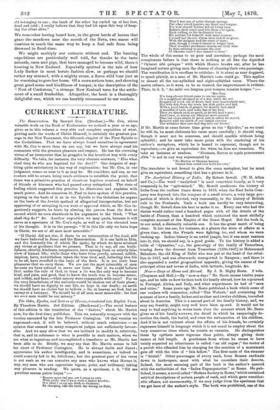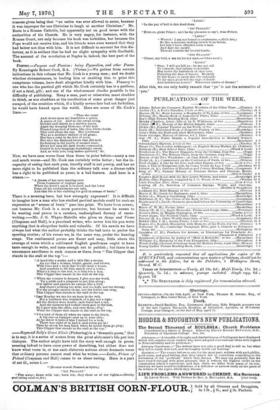Now - a - Days at Home and Abroad. By J. R. Digby Bests.
2 vols. (Chapman and Hall.)—By "now-a-days" Mr. Beate means twelve years ago, and he tells us how he then took his family abroad, how he sojourned in Portugal, Africa, and Italy, and what experiences he had of "men and cities." Some years ago Mr. Bests published a book which some of our readers will remember, called "The Wabash," and containing the account of how a family, father and mother and twelve children, travelled about in America. This is a second part of the family history, and, we may say frankly, might very well have been spared. It would not be easy to find anything in worse taste than the account which Mr. Baste gives us of his family sorrows, the detail in which he unsparingly de- scribes the death, the burial, and even the exhumation of his children. And if he is not reticent about the affairs of his friends, he certainly expresses himself in language which it is not usual to employ about the very numerous class whom he counts as enemies. He distinguishes them by epithets more vigorous than polite, always giving their names at full length. A gentleman from whom he seems to have vainly expected an inheritance is called "an old rogue ;" the rector of a parish who offended him by charging for the erection of a monument gets off with the title of "this fellow." The first-mate of the steamer is "brutal." Other personages of every rank, from Roman cardinals down to innkeepers, meet with what he considers their deserts. Indeed, the most amusing part of the book is the author's quarrel with the authorities of the "Index Expurgatorius" at Rome. He pub- lished, it seems, a novel called "Modern Society in Rome," which contained satirical descriptions of certain people of rank, and which gave consider- able offence, not unreasonably, if we may judge from the specimen that we get here of the author's style. The book was prohibited, one of the
reasons given being that "no satire was ever allowed to enter, because it was improper for one Christian to laugh at another Christian." Mr. Bests is a Roman Catholic, but apparently not on good terms with the authorities of his Church. He is very angry, for instance, with the Roman Court, not only because his book was forbidden, but because the Pope would not receive him, and his friends were even warned that they had better not dine with him. It is not difficult to account for this dis- favour, as it is evident that he had no slight sympathy with Garibaldi. The account of the revolution at Naples is, indeed, the best part of the book.































 Previous page
Previous page